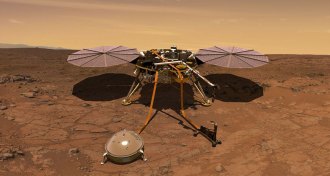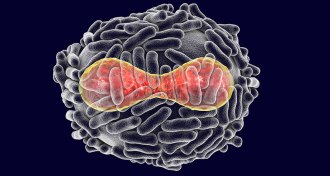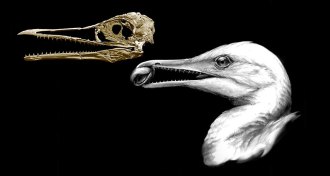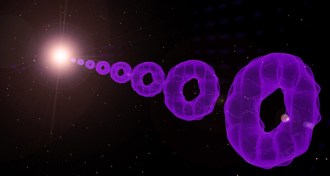News
-
 Genetics
GeneticsAdapting to life in the north may have been a real headache
A cold-sensing protein has adapted to different local climates, also affecting risk of migraine.
-
 Planetary Science
Planetary ScienceNASA gets ready to launch the first lander to investigate Mars’ insides
The InSight lander is launching to Mars on May 5 and is expected to be in position to sense seismic activity by early 2019.
-
 Health & Medicine
Health & MedicineFDA approves the first smallpox treatment
Concerns about bioterrorism fueled the development of the first treatment for smallpox.
-
 Animals
AnimalsThis ancient fowl bit like a dinosaur and pecked like a bird
A new fossil of Ichthyornis dispar helped scientists create a 3-D reconstruction of the ancient bird’s skull, shedding light on early bird evolution.
-
 Climate
ClimateBull sharks and bottlenose dolphins are moving north as the ocean warms
Rising temperatures are making ocean waters farther north more hospitable for a variety of marine species.
-
 Physics
PhysicsNeutron stars shed neutrinos to cool down quickly
Scientists find the first clear evidence of rapid cooling of a neutron star by neutrino emission.
-
 Genetics
GeneticsNew genetic sleuthing tools helped track down the Golden State Killer suspect
DNA sleuths may have adapted new techniques for identifying John and Jane Does to track down a serial killer suspect.
-
 Physics
PhysicsA DIY take on the early universe may reveal cosmic secrets
A conglomerate of ultracold atoms reproduces some of the physics of the early universe.
-
 Earth
EarthPumping water underground for power may have triggered South Korean quake
A 2017 South Korean earthquake may have been caused by human activities, two new studies suggest.
-
 Tech
TechWebsite privacy policies don’t say much about how they share your data
Privacy policies don’t reveal the half of how websites share user data.
-
 Environment
EnvironmentThis plastic can be recycled over and over and over again
A new kind of polymer is fully recyclable: It breaks down into the exact same molecules that it came from.
-
 Psychology
PsychologyIn China, coffee shop habits show cultural differences tied to farming
Farming histories have shaped behavior in northern and southern China.
By Bruce Bower